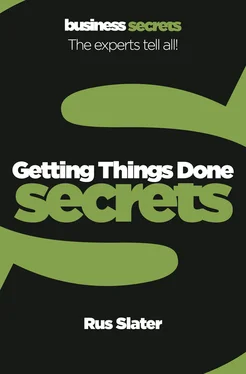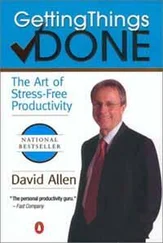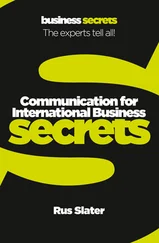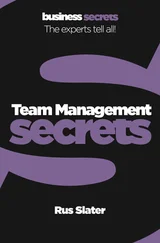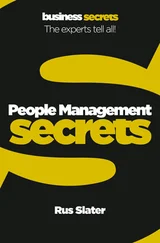Collins Business Secrets – Getting Things Done
Collins
A division of HarperCollins Publishers Ltd.
1 London Bridge Street,
London SE1 9GF
First published in Great Britain in 2010 by HarperCollins Publishers
Published in Canada by HarperCollins Canada. www.harpercollins.ca
Published in Australia by HarperCollins Australia. www.harpercollins.com.au
Published in India by HarperCollins PublishersIndia. www.harpercollins.co.in
FIRST EDITION
Copyright © HarperCollins Publishers 2010
SECRETS and BUSINESS SECRETS are trademarks of HarperCollins Publishers
Rus Slater asserts the moral right to be identified as the author of this work.
A catalogue record for this book is available from the British Library.
CONDITIONS OF SALE
This book is sold subject to the condition that it shall not, by way of trade or otherwise, be lent, re-sold, hired out or otherwise circulated without the publisher’s prior consent in any form of binding or cover other than that in which it is published and without a similar condition including this condition being imposed on the subsequent purchaser.
All rights reserved under International and Pan-American Copyright Conventions. By payment of the required fees, you have been granted the non-exclusive, non-transferable right to access and read the text of this ebook on screen. No part of this text may be reproduced, transmitted, downloaded, decompiled, reverse engineered, or stored in or introduced into any information storage and retrieval system, in any form or by any means, whether electronic or mechanical, now known or hereinafter invented, without the express written permission of HarperCollins ebooks
HarperCollins Publishers has made every reasonable effort to ensure that any picture content and written content in this ebook has been included or removed in accordance with the contractual and technological constraints in operation at the time of publication
Source ISBN: 9780007324460
Ebook Edition © MARCH 2010 ISBN: 9780007360413
Version: 2018-07-16
Cover Page
Title Page
Copyright
Author’s note
Getting things done is the way to get on in life
Knowing what things to do
1.1 Check your bank balance of time
1.2 Ask for clear instructions
1.3 See the relevance of the bigger picture
1.4 Identify what’s relevant to you
1.5 Do the ‘right’ things right
1.6 Plan for output, not activity
1.7 DREAM to get more done
1.8 Have a personal vision or mission
1.9 Know WIIFM
1.10 Make ‘to do’ lists
Knowing how to do things
2.1 Decide if ‘how’ is important
2.2 Fit into a bigger process
2.3 Find out how others do it
2.4 Set quality measures
2.5 Know how to KISS
Knowing when to do things
3.1 Prioritize this – or that?
3.2 Look at effort versus pay-off
3.3 Go for quick wins
3.4 Use your body clock
3.5 Schedule your tasks
3.6 Schedule for task dependency
3.7 Schedule for resource dependency
3.8 Schedule for concurrent activity
3.9 Use your waiting time
Working to your plan
4.1 Deal with people distractions
4.2 Deal with other distractions
4.3 Use technology
4.4 Beware the Seven Wastes of Time
4.5 Manage your meetings
4.6 Fight fatigue
4.7 Practise ‘good housekeeping’
4.8 Avoid procrastination
4.9 ‘Sharpen the saw’
Saying “no”
5.1 Don’t say “yes” to every request
5.2 Just say “no”
5.3 Use 5Y questioning
Dealing with problems
6.1 Assess risks sensibly
6.2 Manage risks well
6.3 Define problems
6.4 ‘Appreciate’ problems
6.5 Choose a quick fix, then a long fix
6.6 Find the root cause
6.7 Learn how to improvise
Asking others to do things
7.1 Work to YOUR strengths
7.2 Influence others
7.3 Give good instructions
7.4 Learn the art of delegating
7.5 Use WIIFYs
7.6 Say “thank you”
7.7 Learn from doing
Jargon buster
Further reading
About the Author
About the Publisher
This book is dedicated to Margaret Ellen Slater
(1922–2009)
Getting things done is the way to get on in life
If you want to get on in your career or your home life you will need to get things done. In the modern world, however, there are lots of different people wanting lots of different things to be done, and you can’t do everything for everyone unless you get much better at a number of different things.
I’ve been working for over 15 years with individuals and organizations to help them to find ways of getting more done. This ranges from teams with enormous workloads and tight deadlines to individuals simply looking to improve their productivity. I’ve learned many secrets and tricks over the years. Some I’ve discovered myself, but many I’ve learned from others; humans are wonderfully inventive.
This book aims to help you to get better at managing your life to allow you to get more of the things done that you need to get done. It contains 50 secrets, grouped into seven themed chapters. If you follow the secrets you will find that you amaze yourself at how much you can actually achieve!
“If we did all the things we are capable of doing we would truly astound ourselves”
Thomas Edison (1847–1931), American inventor
The seven themed chapters are:
• Knowing what things to do.You need to know what it is that needs to be done. You also need to be happy that you are doing the ‘right’ thing.
• Knowing how to do things.Sometimes you have to do things in a way that is laid down by the organization; other times it is up to you.
• Knowing when to do things.You aren’t likely to have just one thing to do – you probably have loads, so you need to know how to prioritize tasks.
• Working to your plan.You know what and how you want to work, but people keep distracting you. How do you manage distractions so that you can get things done?
• Saying “no”.You could get it all done if only people wouldn’t keep asking you to do other things. You need to learn when to say “no”.
• Dealing with problems.You thought you could do that job in an hour, but something has gone wrong. Here’s how to prevent and solve these problems.
• Asking others to do things.Sometimes the best way to do something is to get someone else to do it for you. This shows how you can successfully enlist the help of other people.
Learn the secrets of planning, prioritizing and managing workloads.
Knowing what things to do
Firstlyit is critically important to recognize that you are responsible for your own destiny. This chapter aims to help you set out your personal mission or vision, to recognize the value of using your time wisely and to develop some foundation strategies to help you manage your time. You need to ensure that the things you do are of value both to you and to your organization.
1.1 Check your bank balance of time
Imagine you have an account at a bank where you automatically get credited each morning with $86,400. Every evening the bank takes back whatever part of the balance you failed to spend during the day. Nothing can be carried over or transferred. What would you do? Well, I’d try to spend every cent, and I bet you would too!
Читать дальше
